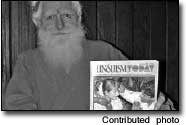The publishers of Hinduism Today magazine no longer have any have beef with McDonald’s. McDonald’s attorneys settled a lawsuit in 2002 for misleading customers that restaurant French fries were vegetarian, when in fact they were cooked with beef flavoring. That
The publishers of Hinduism Today magazine no longer have any have beef with McDonald’s.
McDonald’s attorneys settled a lawsuit in 2002 for misleading customers that restaurant French fries were vegetarian, when in fact they were cooked with beef flavoring.
That same year, leaders with the fast-food giant agreed to pay a $10-million settlement to various afflicted groups, a settlement which included almost $255,000 for Hinduism Today, an international magazine published by Kauai’s Hindu Monastery at Wailua Homesteads.
According to Paramacharya Palaniswami, editor-in chief of the publication, leaders at Kauai’s Hindu Monastery plan to place the entire amount in the magazine’s permanent endowment. He said none of the principal will be touched, so this will be a perpetual source for funding outright 1,000 or more subscriptions a year forever, or subsidize a larger number.
Palaniswami said after McDonald’s leaders agreed to settle, a blue-ribbon panel was established to identify groups whose members should be compensated.
Hinduism Today officials were among those original groups. Three years later, group members received their settlement.
“It surprised us. We’re not a giant organization,” Palaniswami said. He said that, because the suit was initiated by a Seattle lawyer, Harish Bharti, a vegetarian Hindu who made a habit of identifying the ingredients in purportedly-vegetarian foods, Hindu-related organizations probably had a better chance of being recognized for compensation.
According to The Associated Press, on June 5, 2002, officials with McDonald’s Corp. agreed to donate $10 million to members of Hindu organizations and other groups to settle lawsuits filed against the chain for mislabeling French fries and hash browns as “vegetarian.”
McDonald’s leaders also posted an apology on their Web site, acknowledging that mistakes were made in communicating to customers and the public about the ingredients in the fries and hash browns. The vegetable oil used to prepare the fries and hash browns was not pure, but contained essence of beef for flavoring purposes, according to company officials. Many Hindus consider cows sacred, and do not eat beef.
Palaniswami said that, for Hindus like Bharti, this is the crucial element. To eat something tainted by any remnant of beef is akin to blasphemy, Palaniswami added.
As for whether this means McDonald’s leaders will become more culturally sensitive, Palaniswami said he wasn’t so sure.
“It’s hard to say what, if anything, such a conglomerate learns from such a small-potatoes issue, small in their financial world.
“They are getting enough messages from society about health and obesity that one can only hope they will realize their importance to American well-being and respond wisely. The fact that they still have not changed the fries’ ingredients is one indication of how sensitive they are,” he added. “Still, more voices from Americans cannot but help them see the light.”
Referring to what he dubbed the “McSettlement,” Palaniswami said, “in short, their supersized endowment will educate Americans, especially youth, about the merits of a veggie lifestyle, which has been a Hindu ideal for 6,000 years or more.”
According to Palaniswami, the problem for McDonald’s leaders was that the “new,” vegetable-oil-cooked fries didn’t taste like their popular, tallow-cooked fries, a quandary they solved by including a beef flavoring. Under U.S. government food guidelines, they were allowed to call that flavoring a “natural flavor.”
But because of the hype over the switch to vegetable oil for frying, vegetarians assumed — and McDonald’s officials did not try to dissuade that assumption — that the fries were now vegetarian.
Bharti sued McDonald’s leaders in 2001, and that action grew into a lawsuit involving a number of lawyers and leaders of various organizations. Ultimately, Hindus, Sikhs, Jews, Muslims, vegetarians and vegans joined the fray. Jews joined because the beef flavoring was not kosher, and Muslims because it wasn’t halal (the Muslim equivalent of kosher).
According to the McDonald’s Web site, the company is the leading global foodservice retailer, with more than 30,000 local restaurants serving nearly 50 million people in more than 119 countries each day, generating more than $40 billion in annual system-wide sales.
Hinduism Today reaches millions of Hindus and others attuned to its content and teachings in 39 countries, according to information provided by Palaniswami.
He said the publication is geared for the larger Hindu world. Kaua‘i, he said, has only about 30 Hindus.
Leaders with the Hindu Heritage Endowment, founded by Hinduism Today’s creator, Satguru Sivaya Subramuniyaswami (Gurudeva), were invited to submit a request for settlement proceeds.
Officials of the Hindu Heritage Endowment proposed to put any settlement share in its Hinduism Today Distribution Fund, to increase the magazine’s free distribution in the United States, on the basis that the magazine’s leaders have consistently promoted vegetarianism among Hindus.
Palaniswami contributed extensive information and background for this report.
- Andy Gross, business editor, may be reached at 245-3681 (ext. 251) or agross@pulitzer.net.


